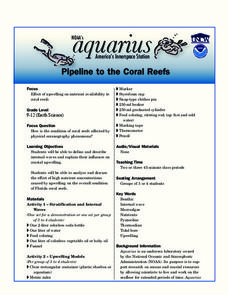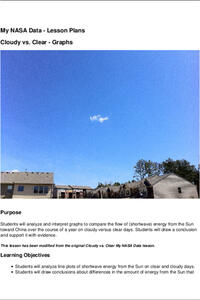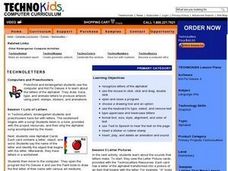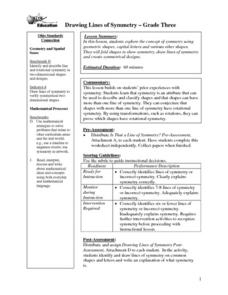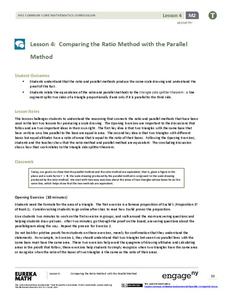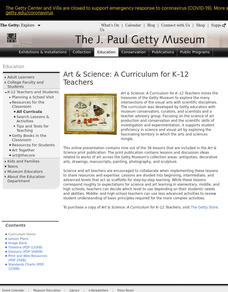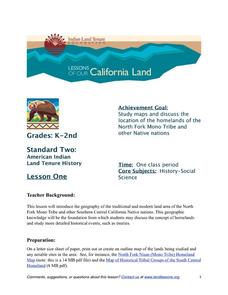EngageNY
Grade 9 ELA Module 3, Unit 3, Lesson 7
As the unit on research writing draws to a close, class members continue to revise and edit their papers, this time focusing on grammar, spelling, and punctuation (colon and semicolon).
Florida International University
Pipeline to the Coral Reefs
Discover firsthand the effects of internal waves on coral reefs. Through a series of experiments, learners simulate internal waves and upwelling events as they make observations on the movement of water and other debris. They then...
Brigham Young University
To-Scale Models
Guided by their analysis of a scene, their initial sketches, and renderings, set designers begin to craft a scaled, 3-D model of the set of the play they have chosen.
Kentucky Department of Education
Number Operations in Base Ten: Division and Interpreting Remainders
What do I do with what is left over? The formative assessment lesson lets individuals show what they understand about remainders in multi-digit division problems. Teams work together to match drawings with division problems before...
EngageNY
Close Reading: Excerpt 5 of “The Digital Revolution and the Adolescent Brain Evolution”
Class members consider how technology affects social interactions as they continue reading an article about the digital revolution and adolescent brain development. Then, working in pairs, scholars answer text-dependent questions and...
NASA
Cloudy vs. Clear - Graphs
Explore the link between solar energy and cloud cover using real data from NASA from China! Future climatologists analyze and interpret graphs of solar energy on clear and cloudy days using a literacy cube. Investigators draw conclusions...
Curated OER
Draw To Scale The E-Z Way
Fourth graders draw a rough floor plan of a house to scale without using a ruler to determine measurements. They see how architects use scale to draw blueprints, and solve math problems using scale.
Curated OER
Lines and Angles
Sixth graders explore lines and angles. They create visual representations of lines, rays and angles by drawing them on paper and using a geoboard. On paper, 6th graders write a summary of the characteristics of their representations.
Curated OER
Techno Letters
Learners explore the alphabet by completing a computer activity. In this letter identification lesson, students utilize Kid Pix to create artwork based upon each letter of the alphabet. Learners utilize drawings, type and animation to...
Curated OER
Framing the Landscape
Students draw their own drawings after learning about composition of drawings and lines. In this drawing lesson plan, students learn about different lines they can use while drawing. Then they go outside and draw their own.
Learning to Give
Humphrey The Lost Whale
The children's book Humphrey the Lost Whale tells an amazing tale of a community joining together for a common cause. Read this book with your class, making connections between the events in the story and personal experiences of young...
Curated OER
Travlin' Through the Basin: Guided Imagery
Students listen to a story. In this imagery lesson, students listen to nature sounds of the Everglades, water and forest. Students listen to a reading of the Tangipahoa River guided imagery passage. Students share their feelings inspired...
Curated OER
Drawing Lines of Symmetry
Third graders explore the concept of symmetry using geometric shapes, capital letters and various other shapes. They fold shapes to show symmetry, draw lines of symmetry and create symmetrical designs.
Curated OER
A Guided Journey Into the Past
Fourth graders use guided imagery to discover and judge an alternative way to enjoy artifacts without removing them from archaeological sites.
EngageNY
Comparing the Ratio Method with the Parallel Method
Can you prove it? Lead your class through the development of the Side Splitter Theorem through proofs. Individuals connect the ratio and parallel method of dilation through an exploration of two proofs. After completing the proofs,...
NOAA
Deep-Sea Ecosystems – A Tale of Deep Corals
Many have debated which came first, the chicken or the egg, but this lesson debates which came first, the hydrocarbons or the carbonate reef. After a discussion on deep-sea corals, scholars receive a set of questions to research and...
Curated OER
Making Healthy Food and Activity Choices: Putting the Pyramid Together
Students work with the Food Guide Pyramid. In this Food Guide Pyramid instructional activity, students draw a large rendering of the food pyramid on a piece of butcher paper. They cut out pictures of foods and place them on the food...
Curated OER
Self Portrait on Paper
Learners are guided into creating their own self-portrait in steps using colored pastels. They also use their self-portraits as a springboard to write a personal narrative. This is a cool lesson!
Curated OER
Clearly Classified
Young scholars review the classification system for living organisms and apply it the classification of insects and flowers in the still life by Ambrosius Bosschaert. They create a chart classifying the animals and plants in the painting...
Curated OER
2-D and 3-D Presents at Pedro's Party
Fifth graders draw 2-D and 3-D shapes. They sketch and label geometric figures with correct terminology, then explore parallel and perpendicular lines. Pupils sort and classify shapes drawn.
Curated OER
Daniel's Story Study Guide
Students explore the plight of Jews during the Holocaust. In this World War II lesson, students read Daniel's Story by Carol Matas and complete the provided comprehension, characterization, and vocabulary activities.
Curated OER
Anticipation/Reaction Guides and Discussion Groups
Seventh graders study geometric shapes around the classroom. In this geometry lesson plan, 7th graders discuss their answers in groups to the Anticipation/Reaction guide handout. Students complete the reaction side of the guide and...
Curated OER
Study Guide for Chapter 12: The Cell Cycle
In this biology worksheet students map out and describe the process of mitosis for the nine questions. The last four questions are several combined in each.
Indian Land Tenure Foundation
Maps and Homelands
You are never too young to learn about maps. To better understand the concept of a homeland, students work together to construct a map of their local area out of paper puzzle pieces. They'll put the maps together and then add details by...



